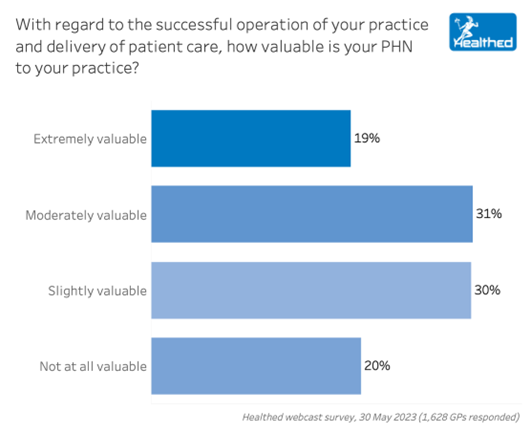Articles / Peeved with your PHN?

0 hours
These are activities that expand general practice knowledge, skills and attitudes, related to your scope of practice.
0 hours
These are activities that require reflection on feedback about your work.
0 hours
These are activities that use your work data to ensure quality results.
These are activities that expand general practice knowledge, skills and attitudes, related to your scope of practice.
These are activities that require reflection on feedback about your work.
These are activities that use your work data to ensure quality results.
Primary Health Networks (PHNs) are supposed to be improving access, quality and coordination of care, particularly for the most vulnerable Australians.
Set up and funded by the federal government, they are responsible for assessing the needs of their region, commissioning targeted health services and working closely with health professionals to improve workforce capacity and use of resources.
Earlier this month, the annual performance report for 2020-21 was released, finding that the majority of PHNs met many of their key performance indicators, and had improved on the previous year in terms of supporting specialist drug and alcohol treatment services and improving workforce performance targets, including establishing partnerships with stakeholders.
Yet Healthed’s survey of more than 1600 GPs found not only wild variation in the value PHNs provide, but also that many had no relationship with their PHN at all.
Demonstrating the polarisation, about one in five GPs rated their PHN as “extremely valuable,” with the same proportion saying their PHN was “not valuable at all.”

In the free text responses, many GPs said they had no interaction with their PHN whatsoever— with several stating that they did not even know what it was or felt it didn’t concern them if they weren’t a practice owner.
“The thing that struck me the most is just how disengaged most GPs and most GP owners are from PHNs,” said Dr Mukesh Haikerwal, of the Australian General Practice Alliance, which has been campaigning for four years to increase the transparency with which PHNs operate. He is also a practice owner and past president of the AMA.
“The vast majority of comments were ‘We don’t know what they are. We don’t know what they do. We don’t have anything to do with them.’” Dr Haikerwal continued.
“In theory PHNs are supposed to be in the sector to try and enhance support and promote general practice and help general practitioners do their work. So to me that was quite significant negativity from that point of view,” he said.
Australia has 31 PHN regions, which align with local hospital networks. Although funded by the federal government, they are independent organisations, which may explain why doctors report such variability in their experiences with them.
The annual performance report also showed substantial room for improvement in mental health in particular. Only about 55% of PHNs met their targets for people accessing PHN-commissioned psychological therapies or interventions, and less than half met the goals for people accessing clinical care coordination services. No PHNs met the target of 100% follow up of clients at risk of suicide.
Here’s a sample of what surveyed GPs had to say about their PHN:
“Too complex, too hard to access, constantly changing and not helpful when we were finally able to contact to try and get help for patients.”
“Their help and assistance have been much appreciated and invaluable.”
“Intrusive and unhelpful – a gross waste of funding…”
“Data extraction tool corrupted our software and caused a major disruption. No accountability by PHN. Still unresolved.”
“The PHN provides good educational support and I would be happy for data to be analysed if it achieved the measuring outcome CPD and was secure.”
“I am not involved with the PHN as a rule, so I have no idea about any of their requirements. I have not found contact with them very useful and really have no dealings with them, if I can help it (unlike the Divisions of General Practice, now sadly defunct!)”
“PHNs are getting bigger and more intrusive every year.”
“No idea who or where they are…”
“I have no relationship with PHN. I do not know what they do or the service provided in primary health. Just another government body being employed to do nothing.”
“They have been very useful, as without the data extraction, it is difficult to organise measurement of outcomes for my continued professional development points.”
“I am not involved in the administrative side of the practice and therefore I am unaware of the extent of PHD involvement in our practice.”

MHT For Women With History or Risk of Cancer

Muscle Health in the Elderly

GLP-1s For OSA

Oral Corticosteroid Stewardship For Asthma – Why it is Important



Strongly agree
Somewhat agree
Neutral
Somewhat disagree
strongly disagree
Listen to expert interviews.
Click to open in a new tab
Browse the latest articles from Healthed.
Once you confirm you’ve read this article you can complete a Patient Case Review to earn 0.5 hours CPD in the Reviewing Performance (RP) category.
Select ‘Confirm & learn‘ when you have read this article in its entirety and you will be taken to begin your Patient Case Review.
Menopause and MHT
Multiple sclerosis vs antibody disease
Using SGLT2 to reduce cardiovascular death in T2D
Peripheral arterial disease
